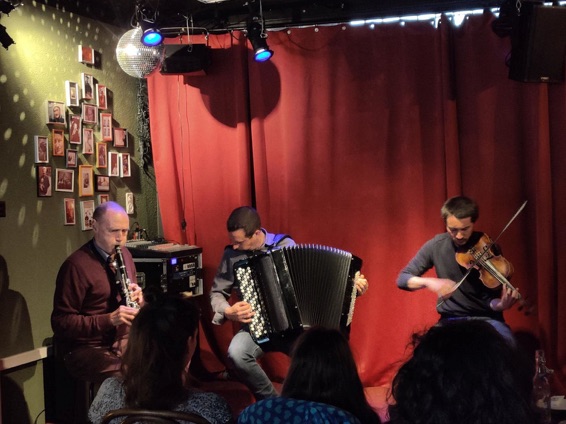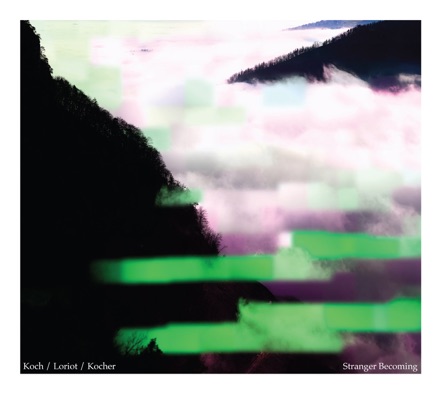Neither/Nor Records


Jonas Kocher interviewed by Henry Fraser in November 2022 for the release of Stranger Becoming (n/n 020)
Henry Fraser: It seems to me that there are particular limitations at play here (perhaps established a priori or borne out in real time) without which the scope and subtly of musical development documented here would not be possible - a primary example of this (to my ears) is the registral and timbral limitations inherent to this instrumentation (clarinet, accordion, viola), which is augmented by the orchestrational choices y'all are making. With that in mind, how did this trio come to be (socially, aesthetically, formally, etc.)?
Jonas Kocher: The three of us have known each other for a long time. The trio came into being somewhat by chance in response to an invitation Hans Koch received from a festival in Germany in 2020; after that first concert, we decided to continue playing. Despite the regular working sessions that followed this concert, I have the impression that the trio’s real music only came to light during the recording session for this CD in February 2021. This impression was then confirmed by listening to the recordings again and choosing the material for the album - this process took place individually and collectively through numerous listening sessions and discussions.
Personally, the instrumentation of the trio immediately reminded me of a Swiss folk music trio, with a certain orchestral dimension. We also have a way of breathing and circulating sounds within the ensemble that is very close to chamber music. In fact, all three of us come from a classical background! I feel very free with this trio; I have the impression that everything is possible and there is great trust between us. Frantz and I have naturally gone towards very melodic, sometimes harmonic and often repetitive modes of playing, whereas in none of our other respective projects do we go in this direction. It's really exciting to see how one context or another will influence our playing.
We don't put limitations on ourselves. We sometimes talk about what we like about the trio or what we're not sure about, but we don't limit ourselves in our playing by any set rules. I think that the gradual discovery of our music, as described above, has gradually led us to a collective understanding of it and to follow the natural flow offered by this trio.

JK: The phrasing and collective breath in this trio is also an aspect that was revealed little by little during the work. At the beginning we played more with so-called "extended techniques" and textures, which induced a completely different phrasing, even excluding any kind of traditional phrasing. But little by little, the "natural" breaths of our respective instruments - bow length, human breath and the opening/closing of the accordion bellows - came to the surface and mixed with the extended techniques and the work on timbre and textures. I think that the mixture of these elements characterizes our music as much as any cultural perspective. We are all three coming from the tradition of European classical music, conservatory, repertoire, precision, etc.. which is also undeniably found in our music, in our way of phrasing. All these elements are superimposed or alternating throughout the pieces, depending on the way we deal with them collectively and individually at the time of performing the music.
HF: I am very interested in this notion you bring up, that new forms or modes of playing can derive from the mechanics of playing a particular instrument, as opposed to the mechanics deriving from music one hopes to conceive. Interestingly, though, I have often utilized this idea in developing a complete music that incorporates a vocabulary of extended techniques, whereas you’re invoking it here as distinct (or a return) from those techniques. I’m wondering if there is some underlying commonality that contributes to these (potentially distinct) approaches cohabiting so nicely on the record. Did this idea – that there are formal implications to be drawn from technical exploration – factor into your initial departure from traditional techniques?
JK: Again, there was no particular decision on our part beforehand that influenced the music. All three of us have researched and developed a vocabulary of extended techniques on our respective instruments in the past, which has led each of us to work with various groups that each focus on specific sonic, structural or musical aspects. I would like to point out here that for my part, practicing a little electronic music in the early 2000s opened up new sonic and formal perspectives, altering my relationship to my instrument, the accordion, as well as my musical thinking in profound ways. I was able to really work on sound, colors, durations, textures and thus get out of the classical musical thinking, the form, the motif and its development - aspects with which I grew up and from which I took a long time to detach myself. Later, the collaboration with electronic musicians, my duo with Gaudenz Badrutt in particular, demanded specific modes of playing and generated a different instrumental style. All this led me to explore different ways of playing the accordion, and to develop so-called "extended" techniques which are in fact my own techniques and playing modes. For a few years now, I have been in a process of synthesis between these so-called "extended" techniques and more traditional ways of playing that I now approach differently, in a much freer way. And depending on the context, I use certain techniques more or less. In the case of the trio, my playing constantly oscillates between tradition and pure sound production close to electronic playing modes; it is very playful!
HF: I find myself working a lot on a similar integration of new approaches or techniques that I want to find a function for in my music (disparate as they may first appear). Can you elaborate on what that process of synthesis is like for you (in the practice room, playing with others, etc.)?
JK: My approach is empirical, made up of a sum of different processes, the result of which is, fortunately, only partially controlled. I work on specific technical and sonic aspects of the instrument in my studio, and then I try to integrate them into the performance. But without thinking about them too much, without forcing them too much, just giving them space. This of course requires a certain amount of time to mature, until these aspects can be integrated naturally into my language. I also do mental work that consists of varying my perception of the playing itself, training my ability to place this perception in the sound itself as well as being able to place myself outside of it, as if I were a listener of my own music. I am working on being able to make rapid changes in focus and distance, both in relation to my playing and the material I am using. All this allows me to gain flexibility and inventiveness when improvising, to be able to play with any sound or performance situation in the moment and to be able to use extended techniques as well as more traditional modes of playing. The process of synthesis then takes place intuitively, nurtured by all the work done beforehand. Listening to recordings of past concerts or sessions is also crucial. It allows me to feed my work and to discover new paths to explore as well as realize certain things that need to be reconsidered. But, to sum it up, I would say that listening allows me to integrate absolutely everything at the moment of playing. It's through listening that I create meaning, that I connect the elements at the moment of improvising. It's a structuring listening that is at the heart of the creative process.

JK: Playing with others or solo makes me apply the aspects I develop in my solo practice or reflection in different ways. When playing with others, my thinking becomes much more orchestral and the possibilities offered by this playing context are enormous. Thinking works in a particular way in a collective context. Each group (its instrumental particularities, the personality of the musicians as well as the number of players) has its own characteristics, which means that each time I will think about the music in a different way. In solo, all this becomes much denser and tighter. In this particular situation that is the solo, I try to put myself mentally "behind" the music, to produce sound in a random and controlled way at the same time, to then improvise with what is there. A situation like a feedback of which I control only some parameters, but not everything that can happen. Yes, I improvise solo in my regular practice too, so I work on letting go of what I produce. I practice finding the right mental placement necessary for solo playing, for creating this feedback between the instrument/music and myself.
HF: Circling back to what you said before; when improvising, do you feel yourself making changes in your focus, distance, mode of listening in response to something you hear, as a kind of new (intentional) musical idea? Or is it something more oblique and subconscious? (or neither, or both)?
JK: At the moment of improvisation, there is a very complex phenomenon of mental activity that takes place, between control and letting go, between intuition and calculation. In collective playing, this happens in response to what my comrades are playing, in response to my own playing or to external sounds or events. It's a kind of incessant back and forth between all these levels of sound, with constantly changing focus and reaction speeds, sometimes done very consciously and sometimes completely subconsciously. It's a virtuosity of listening and a fascinating way of being in the present moment that puts me in a second state, between extreme lucidity and total detachment from what is happening.
HF: Well, congratulations on this new record. You three have found a unique music together and it’s a pleasure to listen to – what do you guys have planned for 2023?
JK: Thanks Henry! We don't have a tour in prospect at the moment. We'll see about playing a few shows next spring. But we will continue to work on our music, it is fragile and needs to be taken care of, again and again.
Photo credits and information:
The album cover is by Rudolf Steiner.
The photo of Jonas is by Annette Boutellier and was taken in Berne in 2022. The photo of the trio is by Sebastian Rotzler and was taken in Biel in 2022.
